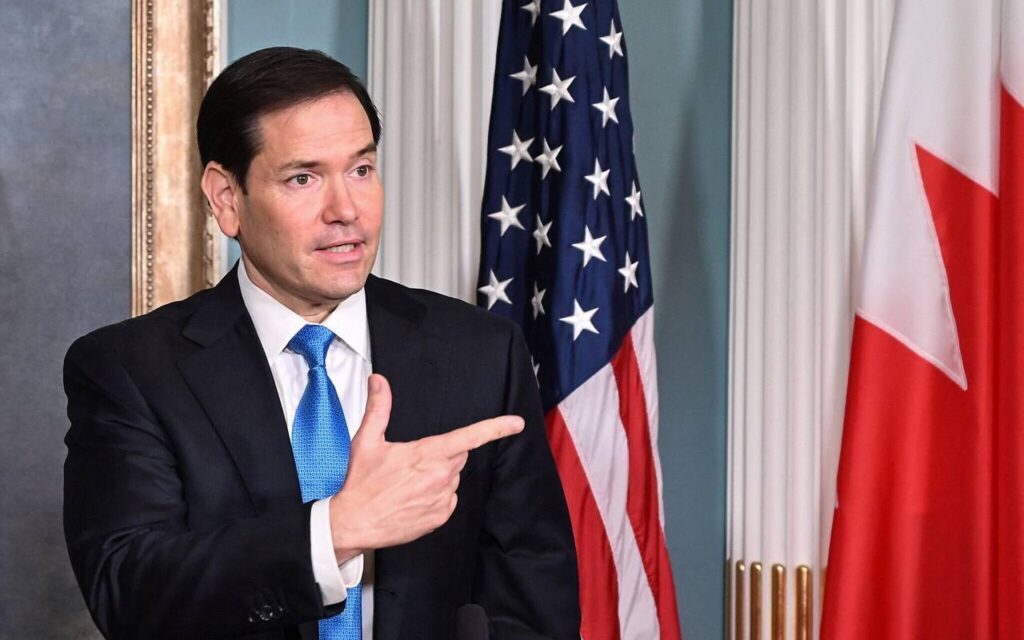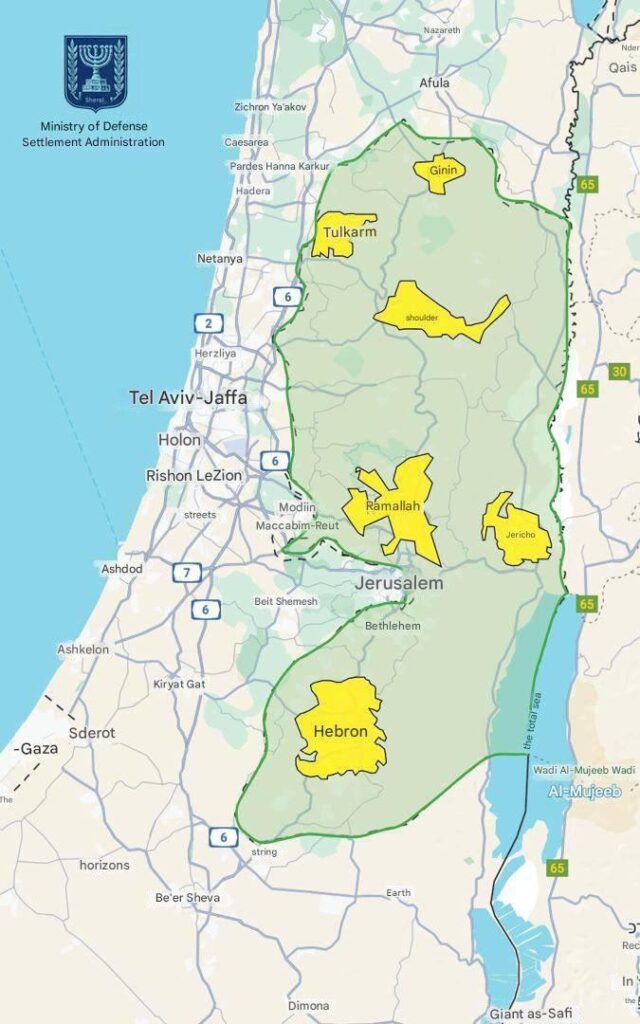
By Rohan Gunaratna
Introduction
The President of the UAE Sheikh Mohamed bin Zayed met in Riyadh with the Saudi Crown Prince Mohamed bin Salman to discuss the Middle East including the future of the Abraham Accords on September 3, 2025. The two agreed that if Israel annexes territories in Judea and Samaria, withdrawal from the Abraham Accords will be on the table and not only for the UAE: “Annexation will slam the door shut also on the prospects of normalization between Israel and Saudi Arabia”

The Israeli terms for Judea and Samaria is the West Bank. Especially after the Hamas led massacre in Israel on October 7, 2023 prompted many Israelis to believe that annexing the West Bank “will strengthen the state of Israel, its security and prevent any questioning of the fundamental right of the Jewish people to peace and security in their homeland”.
The motion, advanced by Prime Minister Benjamin Netanyahu’s coalition is declarative and has no direct legal implications, though it could place the issue of annexation on the agenda of future debates in the parliament.
The idea was initially brought forward in 2024 by Israel’s far-right finance minister, Bezalel Smotrich, who himself lives in an illegal Israeli settlement and holds a position within Israel’s Ministry of Defence, where he oversees the administration of the West Bank and its settlements. As such in his statements, he uses the Israeli Ministry of Defence Logo.

West Bank annexation, [Sep 5, 2025] US Secretary of State Rubio was asked about the possibility that Israel would annex parts of the West Bank and replied: “We told countries considering recognizing a Palestinian state that such a move would create more problems”
The Context
The Abraham Accords aimed to normalise relations between Israel and Arab and Muslim states. The term Abrahamic was used to reflect the commonalities and shared heritage between Muslims and Jews. United Arab Emirates and Bahrain announced in August and September 2020 and signed in Washington, D.C. on September 15, 2020, a set of agreements to establish diplomatic normalisation. Mediated by the United States under President Donald Trump during his first term, the UAE and Bahrain became the first Arab countries to formally recognize Israel since Jordan in 1994.
Sudan and Morocco also agreed to normalize relations with Israel, although Sudan’s agreement remains unratified. In addition to Oman, Trump’s administration is seeking to expand the accords to include Syria, Lebanon, and Saudi Arabia. However, with Israel’s overwhelming response to the Hamas led massacre, Arab and Muslim public opinion changed. A majority of citizens view the Abraham Accords negatively and Middle Eastern governments have taken a step back. According to the poll conducted by The Washington Institute for Near East Policy between November 14 and December 6, 2023, 96% of Saudi participants believed that Arab nations should cut ties with Israel, and only 16% of Saudis approved the view that Hamas should accept a two-state solution.
On July 23, 2025, the Israeli parliament approved a symbolic motion on West Bank annexation with Knesset lawmakers voting 71-13 in favour of annexation, raising questions about the future of a Palestinian state. Israel’s parliament has approved a symbolic measure calling for the annexation of the occupied West Bank. Although it is a non-binding vote which calls for “applying Israeli sovereignty to Judea, Samaria and the Jordan Valley”.

West Bank annexation, [Sep 4, 2025] Secretary of State Marco Rubio has signaled to Israeli officials in private meetings that he does not oppose Israel’s West Bank annexations and that the Trump administration will not stand in the way. Source: Axios
Background
The West Bank, along with the Gaza Strip and East Jerusalem, has been under Israeli occupation since 1967. Since then, Israeli settlements have expanded, despite being illegal under international law and, in the case of settlement outposts, Israeli law.
The annexation of the West Bank, or parts thereof, to Israel has been considered by Israeli politicians since the area was captured and occupied by Israel during the Six-Day War of 1967. East Jerusalem was the first part of the West Bank to be annexed; it was de facto annexed following its occupation by Israel in 1967, and de jure annexed following the 1980 Jerusalem Law. Annexation of the Jordan Valley, first proposed in the 1967 Allon Plan, was announced by Israeli Prime Minister Benjamin Netanyahu in September 2019 as his plan, subject to the outcome of the September 2019 Israeli legislative election.
Israeli law has been applied to Israeli settlements throughout the West Bank, leading to a system of “enclave law” and claims of “creeping annexation”. The application of Israeli law in the West Bank settlements has been described by commentators as “creeping annexation”. Annexation of the West Bank would be condemned as illegal by the United Nations and would break international law.
The center-right Likud party of Israel led by prime minister, Benjamin Netanyahu in 2009 endorsed the two-state solution. However, before the April 2019 Israeli legislative election, he stated his intention of unilaterally annexing Israeli settlements in the West Bank. On September 16, 2019, Netanyahu said in an interview with Israeli Army Radio, “I intend to extend sovereignty on all the settlements and the (settlement) blocs,” including “sites that have security importance or are important to Israel’s heritage,” including the settlements in Hebron.
Shortly before the September 2019 Israeli legislative election, Netanyahu announced his government’s plan to annex the Jordan Valley, if it won the election. On September 10, 2019, he also reaffirmed his previous pledge to annex all Jewish settlements throughout the West Bank but said such a move would not be made before publication of the Trump peace plan and consultations with the US President.
According to B’Tselem, 65,000 Palestinians and about 11,000 Israeli settlers live in the area. According to Peace Now, the proposal includes 30 settlements with 12,778 settlers, 18 illegal outposts, 15 Area A and B communities, including 44,175 Palestinians planned to remain under the nominal autonomous rule of the Palestinian Authority, surrounded by annexed territory with access roads, described by Peace Now as “..alarmingly similar to the Bantustan formula in former Apartheid South Africa” and 48 shepherding communities in Area C including 8,775 Palestinians. The area to be annexed is about 22% of the West Bank, 90% of which is in Area C and 20% of the land is Palestinian-owned; the map that Netanyahu displayed of the area to be annexed had several errors, incorrectly noting the location of several settlements and omitting Palestinian villages. Netanyahu’s map is only a slightly revised version of the Allon Plan map, with the key difference being that the Palestinians are no longer offered access to the international border with Jordan.
Netanyahu said that he had received a green light from the Trump administration. The administration said that there had been no change in United States policy. In response, there was international condemnation of the proposal from Palestinians, the Arab League, Saudi Arabia, Jordan, Turkey, the UK and the UN, the latter stating “..that any Israeli move to impose its administration over the Palestinian territory would be illegal under international law.”
Several Israeli politicians from across the political spectrum and Hebrew media outlets described this announcement as a political stunt for votes, with the former chief of staff and opposition Blue and White MK Moshe Ya’alon saying that Netanyahu had been prepared to evacuate Jordan Valley settlements in 2014.
The Jordan Valley forms part of the larger Jordan Rift Valley. Unlike most other river valleys, the term “Jordan Valley” often applies just to the lower course of the Jordan River, from the spot where it exits the Sea of Galilee in the north, to the end of its course where it flows into the Dead Sea in the south. In a wider sense, the term may also cover the Dead Sea basin and the Arabah valley, which is the rift valley segment beyond the Dead Sea and ending at Aqaba/Eilat, 155 km (96 miles) farther south.
The West Bank is divided into Area A, Area B, and Area C. Area C contains 60% of the West Bank’s area and all Israeli settlements. According to OCHA there are about 300,000 Palestinians in Area C compared to some 2.8 million in Areas A and B.
The Jewish Home party’s official position is in support of annexing Area C alone, although some of its MKs support annexation of the entire West Bank. Leading up to the April 2019 elections, the New Right party, led by Naftali Bennett, Israeli foreign minister and Ayelet Shaked, justice minister, advocated for the unilateral annexation of Area C. Bennett estimates that his plan would involve offering Israeli citizenship to some 80,000 Palestinians living in Area C, which contradicts the UN estimate of 297,000 Palestinians in Area C. Caroline Glick, a New Right MK candidate in the April 2019 elections, supported the annexation of the entire West Bank. Glick supports an application process for Israeli citizenship to Palestinians living in annexed areas and anticipates that not all Palestinians would desire Israeli citizenship or be eligible.
A senior U.S. official in April 2020 said to Barak Ravid in Axio that any Israeli annexations must come “in the context of an offer to the Palestinians to achieve statehood based upon specific terms, conditions, territorial dimensions and generous economic support.” and that “We are prepared to recognize Israeli actions to extend Israeli sovereignty over areas of the West Bank in the context of the Government of Israel agreeing to negotiate with the Palestinians along the lines set forth in President Trump’s vision.” The then U.S. Ambassador to Israel David M. Friedman told Netanyahu’s aides at a meeting of the U.S.-Israeli mapping committee that is examining potential areas that could be annexed, that “the U.S. wants to implement a peace plan, not an annexation plan”. On May 28, 2020, Netanyahu said he was committed to annexing parts of the West Bank once a joint Israeli-U.S. team completes mapping the exact territory based on the conceptual map released by the Trump administration. However, the July 2020 annexation plan was later pushed back.
The Future
The Hamas led attack of October 7, 2023 dramatically changed the Israeli thinking about the future of the Palestinian state. A 2019 Haaretz poll investigated support for annexation among Israelis. According to the survey, 30% did not know, 28% of Israelis opposed any annexation and 15% supported annexing Area C alone. 27% wanted to annex the entire West Bank including 16% who opposed granting political rights to Palestinians and 11% who favored granting political rights. However, the Israeli Vote Index in April 2020, found that 52% of Jewish Israelis supported Israel’s annexation of the West Bank.
Palestinian leaders want all three territories for a future state. Some three million Palestinians and more than 500,000 Israeli settlers currently reside in the West Bank.
Annexation of the West Bank could make it impossible to create a viable Palestinian state, which is seen internationally as the most realistic way to resolve the Israeli-Palestinian conflict.
With the leaders of the UK, France, Belgium, Canada and Australia planning to recognise Palestinian statehood, Israel is threatening to annex West Bank. In 2024, the Israeli parliament approved a symbolic motion declaring opposition to the establishment of a Palestinian state.
Conclusion
Iran does not recognize Israel’s right to exist and views the Palestinian cause as a central regional issue that the Accords ignored. Iran strongly opposed the Abraham Accords, viewing them as a threat to regional stability and an attempt to isolate Iran. Iran’s opposition stems from its non-recognition of Israel’s legitimacy and its ideological commitment to Palestinian self-determination, which the Accords bypass. The Accords also pushed Iran to strengthen its alliances with regional actors and boost military ties with Russia to counter what it perceives as Israeli encirclement and increasing U.S. influence in the region.
Iran was determined to disrupt the Abraham Accords. Through Hamas and its allies, did Iran succeed by disrupting the normalisation of relations between Israel with the Arab world? Iran increased its cooperation with regional non-state actors, including Hezbollah in Lebanon, the Houthis in Yemen, and Hamas in Gaza, to build a network of resistance against Israel and its allies.
An Iranian sponsored group Hamas conducted the massacre on October 7, 2023 with the specific intentions to derail the Abraham Accords.
It is very likely that Hamas as an organisation will be dismantled in the coming months. Nonetheless, Hamas succeeded in disrupting the Abraham Accords.
Israel believes that recognising Palestinian statehood after a horrific attack by Hamas will be construed as a reward for terrorism.
Annexation of West Bank and Gaza are likely if Palestinian statehood is recognised by the UK, France, Belgium, Canada and Australia. Jerusalem is unlikely to annex West Bank at the cost of disrupting the Abraham Accords. As Israel and UAE have built a trusted partnership, it is very likely that Jerusalem will refrain from annexation of West Bank.
Rohan Gunaratna is the editor of the Handbook of Terrorism in the Middle East.